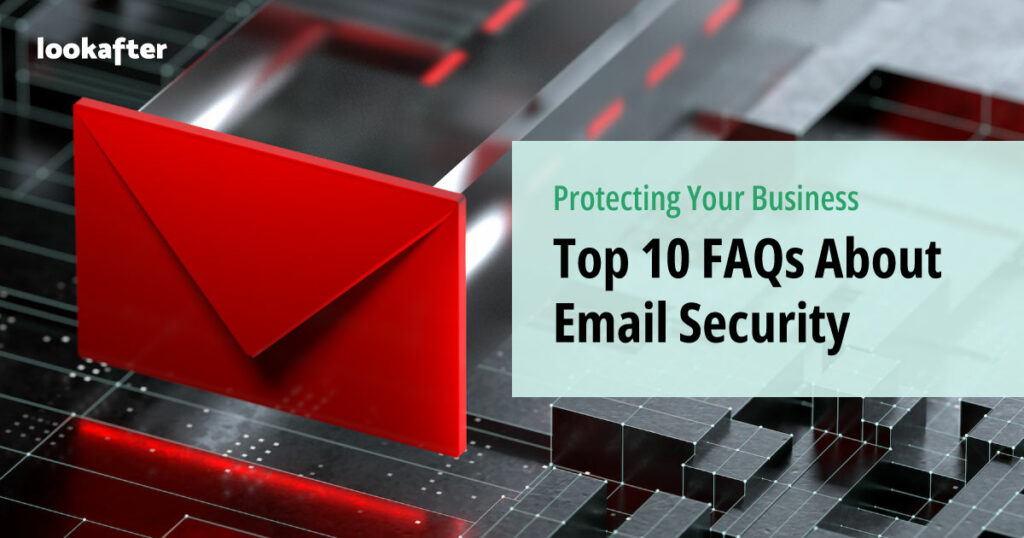Home > Empowering Tips > Protecting Your Business: Top 10 FAQs About Email Security

Imagine you’re steering the ship of your business through the vast sea of the digital world. Emails serve as your compass, guiding you through connections, sealing deals, and boosting productivity. But beware – lurking beneath the surface are unseen dangers, waiting to strike. Cyberattacks threaten to breach your digital fortress. Fear not, though, for we’re here to shed light on the top 10 questions surrounding email security. Join us as we navigate through these FAQs, arming you with the knowledge to safeguard your business against online threats.
1. What is email security, and why is it important for my business?
Email security encompasses measures taken to secure the transmission and content of email messages. It’s crucial for businesses because email is a primary vector for cyberattacks such as phishing, malware distribution, and data breaches. Protecting your email helps safeguard sensitive information and preserves your organization’s reputation.
2. What are the common threats to email security?
Common threats to email security include phishing attacks, where attackers impersonate legitimate entities to trick users into revealing sensitive information, and malware attachments or links that can infect systems. Business email compromise (BEC), ransomware, and spoofing are also significant threats.
3. How can I identify phishing emails?
Phishing emails often contain urgent requests, grammatical errors, suspicious attachments or links, and requests for sensitive information. Be wary of emails asking for login credentials, financial details, or personal information. Verify the sender’s email address and hover over links to reveal their true destination before clicking.
4. What measures can I take to secure my email account?
To secure your email account, consider the following measures:
- Use strong, unique passwords, with a mix of letters, numbers, and special characters.
- Enable two-factor authentication, which adds an extra layer of security by requiring a secondary verification method.
- Ensure both your email client and security software are up to date to protect against vulnerabilities.
- Avoid clicking on suspicious links or downloading attachments from unknown sources.
- Encrypt your emails with SSL/TLS to protect the content during transmission.
- Set up SPF, DKIM, and DMARC to prevent email spoofing and impersonation.
- Regularly monitor your account. Watch out for any unusual activity and report suspicious emails or contacts.
- Train employees on email security best practices to enhance overall awareness and vigilance.
5. Why should I use strong passwords for my email accounts?
Using strong passwords for your email accounts is essential for protecting your business from unauthorized access and potential security breaches. Weak passwords are easy targets for cybercriminals who employ various tactics, such as brute force attacks or dictionary attacks, to guess or crack passwords.
Strong passwords are harder for hackers to guess or crack, making it more difficult for them to gain entry into your email account. By using a combination of uppercase and lowercase letters, numbers, and special characters, you create a robust barrier against potential attackers. Strong passwords help protect sensitive information stored in your email, such as business correspondence, financial details, and personal data, safeguarding both your business and personal interests from cyber threats.
6. How can I prevent email spoofing and impersonation attacks?
Adopt technologies like Sender Policy Framework (SPF), DomainKeys Identified Mail (DKIM), and Domain-based Message Authentication, Reporting, and Conformance (DMARC) to authenticate your emails and prevent spoofing. Educate employees about the dangers of email impersonation and encourage vigilance when verifying email sources.
7. What should I do if I receive a suspicious email?
If you receive a suspicious email, the best course of action is to refrain from clicking on any links or downloading any attachments within the email. Instead, you should report the email to your IT department or email service provider immediately. They can assess the email for any potential threats and take appropriate action, such as blocking the sender or flagging the email as spam. Additionally, you can educate your employees about the importance of being cautious with suspicious emails and encourage them to report any suspicious activity promptly.
8. What is the difference between spam and phishing emails?
The difference between spam and phishing emails is that spam emails are unsolicited messages sent in bulk, often promoting products or services, while phishing emails are deceptive messages crafted to trick recipients into revealing sensitive information such as passwords, credit card numbers, or personal details. Spam emails are annoying but usually harmless, whereas phishing emails pose a significant threat to security as they aim to steal valuable information or spread malware. It’s essential to be cautious with both types of emails and to have proper email security measures in place to protect against them.
9. How can I secure email communication on mobile devices?
Secure email communication on mobile devices by using reputable email apps with built-in security features. Enable device encryption and screen locks on mobile devices to prevent unauthorized access. Avoid connecting to unsecured Wi-Fi networks, and use a virtual private network (VPN) when accessing email from public or untrusted networks.
10. What should I do if my business email account is compromised?
If your business email account is compromised, act quickly to mitigate the damage:
- Change your password immediately to prevent further unauthorized access.
- Run a virus scan on all devices you’ve used to ensure they’re free of malware.
- Alert your IT department or email service provider to get professional help and advice.
- Review your email account for any unauthorized activity or changes.
- Notify your contacts as they may have received suspicious emails from your account to prevent them from falling victim to scams.
Ensuring the security of your business email is an ongoing process that requires vigilance, education, and the implementation of robust security measures. By staying informed about common email security threats and best practices, business users can better protect themselves and their organizations from cyberattacks.